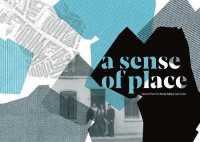- ホーム
- > 洋書
- > 英文書
- > Philosophy
Full Description
For many, the word 'pleasure' conjures associations with hedonism, indulgence, and escape from the life of the mind. However little we talk about it, though, there is pleasure also plays an integral role in cognitive life, in both our sensory perception of the world and our intellectual understanding. This previously important but now neglected philosophical understanding of pleasure is the focus of the essays in this volume, which challenges received views that pleasure is principally motivating of action, unanalyzable, and caused, rather than responsive to reason. Like other books in the Oxford Philosophical Concepts series, it traces the development of the focal idea from ancient times through the 20th century. The essays highlight points of departure for new lines of inquiry rather than attempting to provide a full picture of how the idea of pleasure has been explored in philosophy.
The volume begins by showing how Plato, Aristotle, early Islamic philosophers, and philosophers in the Medieval Latin tradition, such as Aquinas, honed in on the challenge of unifying the variety of pleasures so that they fall under one concept. In the early modern period, philosophers shifted from understanding the logic of pleasure to treating pleasure as a mental state. As the studies of Malebranche, Berkeley and Kant show, the central problem becomes understanding the relation of pleasure to other sensory experiences, and the role of pleasure in human cognition and knowledge. Short interdisciplinary reflections interspersed between essays focus on art of 16th and 17th century textbooks and the difficult music of composers like Bach, which demonstrate translation of these concerns to cultural production in the period. As the essay on Mill shows, the 19th century development of scientific psychology narrowed the definition of pleasure, and so its philosophical focus. Contemporary accounts of pleasure, however, in both philosophy and psychology, are now recognizing the limitations of this narrow focus, and are once again recognizing the complexity of pleasure and its role in human life.
Contents
Series Editor Foreword
Introduction to Pleasure Lisa Shapiro
Chapter 1: Two Platonic Criticisms of Pleasure Emily Fletcher
Chapter 2: Aristotle on the Heterogeneity of Pleasure Matthew Strohl
Chapter 3: This so sullied flesh? Islamic Approaches to Human Pleasures Sajjad Rizvi
Reflection: Engraving Pleasure in Philosophy Teaching Aids Susanna C. Berger
Pleasure in Later Medieval Latin Philosophy: The Case of Thomas Aquinas Martin Pickavé
Chapter 4: Malebranche on Pleasure and Awareness in Sensory Perception Lisa Shapiro
Chapter 5: Pleasures, pains, and sensible qualities in Berkeley's philosophy Melissa Frankel
Chapter 6: Rationally Agential Pleasure? A Kantian Proposal Keren Gorodeisky
Reflection: Musical Pleasure, Difficult Music Roger Mathew Grant
Chapter 7: John Stuart Mill: "Pleasure" in the Laws of Psychology and the Principle of Morals Dominique Kuenzle
Reflection: Pleasure Experience in Schizophrenia Ann M. Kring & Amy H. Sanchez
Chapter 8: A Contemporary Account of Sensory Pleasure Murat Aydede
Bibliography








